The Story of Pablo Moises
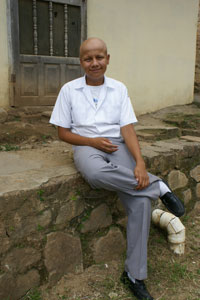 Pablo is a 13-year-old boy who lives in the city of Danli, located at the east side of the capital city, Tegucigalpa. His life has been marked by a rare illness that has caused him the loss of his hair and eyebrows since he was five years old.
Pablo is a 13-year-old boy who lives in the city of Danli, located at the east side of the capital city, Tegucigalpa. His life has been marked by a rare illness that has caused him the loss of his hair and eyebrows since he was five years old.
Because of this Pablo faced depression and nervous breakdowns while growing up. His mother, Petronila, was his support during this time of adjustment. Perhaps the most difficult time for him was school time; the idea of attending school without hair was a hard situation for Pablo. (more…)
A Different Visit to the Doctor
In the colloquial language of Ecuador, a doctor’s visit means a very short visit, a courtesy visit. It’s more like a social ritual through which someone shows his gentleness to others. The name also reflects the short length of a regular visit to the doctor in the city, where this encounter — usually impersonal and cold — lasts only for a couple of minutes.
But Dr. Pablo’s visits are not like that.
How Drug Running Affects a Community
Like in any place where drug smuggling is done, a strong clandestine support structure is needed. A list of packers, sellers, messengers, gunmen, guards, lawyers, policemen, drug-storage-home owners and front men are supposedly kept on payrolls, and the financial benefits are still enough to make the capos richer. Gualey is no exception.
A New Beginning for Eric
Compassion seeks to register the poorest children around the world, and Eric in the Philippines is one of them. Compassion gives hope to those who need it most.
Based on its studies on poverty, Compassion in the Philippines identified Rio Tuba as one of the neediest towns in the country, and Eric’s family is the neediest of them all.
In this isolated town where only one bus line is willing to travel from the main city, Eric’s family is even cut off from the rest of the residents. They live in an unfinished, tiny bamboo hut in the middle of an open field. Although from time to time their closest neighbor gives food and offers help, he often mocks them for their predicament.
Eric’s father, Benny, is a carpenter. He used to earn a daily income of US$5.60 when there was available work. This was not enough to feed his seven children. Since his wife left them in March 2008, Benny stopped working completely to take care of his children full time. (more…)
Ask the Field: Bangladesh and Mexico
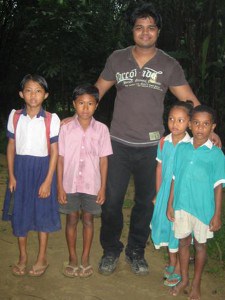 Remember Kamrul, the cycle van driver from Bangladesh you helped buy a cycle van for? Well, David Adhikary is the fine field communication specialist in Bangladesh who reported that story for us. That was one of his first assignments — he just started at Compassion Bangladesh in January. What a nice welcome you gave him!
Remember Kamrul, the cycle van driver from Bangladesh you helped buy a cycle van for? Well, David Adhikary is the fine field communication specialist in Bangladesh who reported that story for us. That was one of his first assignments — he just started at Compassion Bangladesh in January. What a nice welcome you gave him!
Now it’s your turn to ask David about his experiences as a Compassion employee, visiting precious sponsored children, and anything else you’re wondering about Bangladesh.
I’ll tell you a bit about him first. He just finished his electrical engineering degree in December of 2007 when he decided that he wanted to serve the Lord by working with Compassion’s ministry. (An engineer and a writer — talented guy!) He loves English and Bengali literature and is a big sports fan too.
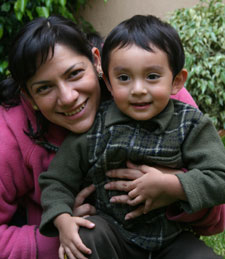 Remember when Chris went to Mexico? He got to meet Cesiah Magaña, who has been working with Compassion Mexico for seven years. She says the seven years have been wonderful — filled with blessings and challenges.
Remember when Chris went to Mexico? He got to meet Cesiah Magaña, who has been working with Compassion Mexico for seven years. She says the seven years have been wonderful — filled with blessings and challenges.
She currently works as the communication specialist, is married and has a precious 2 1/2-year-old son, Jair. She loves driving with her family to the towns around Mexico City, seeing their handicrafts and hearing their stories.
So it’s time to ask your questions of Cesiah and David. I’ll choose ten questions for each of them to answer.
Compassion Haiti’s 40th Anniversary
Compassion started its ministry in Haiti in 1968. At that time, we worked directly through the missionaries established in the country while maintaining no country office or local staff. But through the years, our structure has changed as more and more children have been registered in our programs.
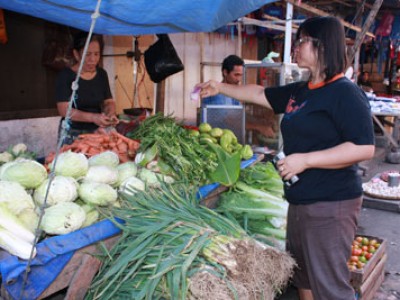
A Day in the Life of a Child Development Center Worker
Selvie, a 41-year-old single parent, has been serving as the coordinator of Elohim Child Development Center for almost two years now.
During her first year at the center, Selvie had been facing obstacles, which came from both her own family and the community around the center.
She had to take care of her two children and her new enlarged family. Her husband had left her after 16 years and left her in anguish. She moved back to her parents’ house, where her two siblings along with their families had just moved in, too.
The community doubted whether Selvie would be able to manage the ministry. They thought it was her fault that her family had been broken.
Surrendering to God’s will is what Selvie has been doing as well as raising her children. She has two children; the oldest, Indriani Natalia, graduated from college few months ago and the youngest, Aldo Aprillio Samuel, is in fifth grade now.
Selvie has been spending up to 12 hours a day for the ministry since appointed to be the center coordinator. Her daily activities are more or less the same:
- shopping for the children’s meal
- going to the center to help the cook prepare the meals and to clean up the church
- checking the reports and the day’s scheduled program
- having praise and worship with children
- talking with parents
- coordinating with staff members after the activity
- going back home
Spend a day with Selvie
A Field Perspective on Sponsor Trips
Wanna peek into my e-mail inbox?
I have the great pleasure of “talking” (read: e-mailing) each day with some of our great staff around the world. They always challenge me with their perspective.
I’ve been reading along with all the posts and comments about visiting your sponsored child, as I weigh the decision of when to make a trip. (I just happen to sponsor children in two of the most expensive countries to visit!)
This e-mail from Samuel Llanes, our field communication specialist in Guatemala, about his recent experience accompanying a sponsor trip gave me a new perspective on sponsor visits.
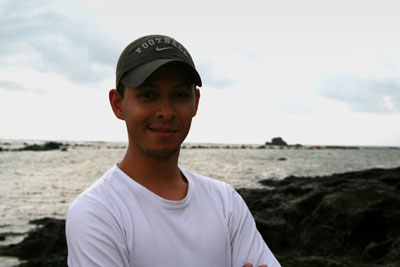
Hi Amber,
I want to share with you about what I learned in this sponsor trip we had this summer.
Commitment
I knew the kind of heart a sponsor is supposed to have but NEVER had the experience of “experiencing” it first hand. It was amazing to see and feel the kind of heart they have and how humble they are. And not just them, but even their family! Some of the sponsors came with their entire family and it was so awesome seeing how their kids were so “into” everything! Some of those kids started passing around a plastic bag to collect food to give later to some of the students at the center. For me, it was really amazing. Also, there were some “advocates” there. I had never had the chance to see one of them, but I saw how a heart like theirs really is! 🙂
Tenderness
I saw some of them who met their sponsored children for the first, second or third time. They were so happy (they were even crying!) when they saw them! For me, it was a very touching thing to witness because I could see and prove their commitment toward our fellow sponsored children! It really touched my heart, and those people are a real blessing to me!
A Genuine Heart for the Poor and Compassion International’s Help
I know that the American culture can sometimes be seen as a cold and individualistic culture, but this trip taught me that not everybody is like that. All the sponsors had an utterly different way of treating people (and even me! Hehe!) and they broke indeed a lot of paradigms I had about the American culture. I never saw hearts like those EVER in my life, and I was completely touched by it.
Love
Seeing how humble their hearts and spirits were for the children it’s something indescribable! I could see God’s love showed there and I couldn’t believe it. It was like they were their very own children!
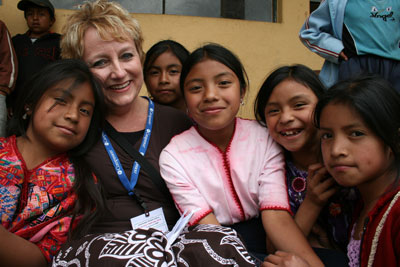
Sam
10 Questions With Roberto Medrano
Your curiosity about out country staff is exciting, and again we have 10 questions that will inform and inspire you to help fight for children in poverty.
We asked Roberto Medrano, communications and trips specialist for Central America and the Caribbean and a member of our El Salvador staff, to answer some of your questions.
1. I just found out that one of my sponsored children has been sponsored four times in the past six years. I was wondering what type of effect this has on children. Do they get to the point where they are not even excited to be sponsored anymore? Is this a common occurrence? (Cindy)
To be completely honest, yes. Some of the children have received the sad news several times that their sponsors canceled. If that has happened several times, the children think something is wrong with them.
It is amazing the influence a sponsor can have on the child. For example, I remember a 25-year-old Compassion graduate. She is a Christian who is married and has two babies. She also serves as a center worker. Even though she is an adult and loves Compassion’s ministry, she always cries because in the 15 years of sponsorship her sponsor did not write one single letter. She wrote her sponsor dozens of letters, but she never received any response.
2. What are the great things about El Salvador that you want us to know about? Tell us about a particular strength or something special about the people of your country. (Lisa Miles)
El Salvador is the smallest country in the Americas, but our people have a great heart. In Central America they call us the smiling country, and I think that is a special thing about our people. We have faced earthquakes, hurricanes, civil war, and poverty, but in any problem if you ask a Salvadoran, “How are you doing?” he or she will say with an honest and warm smile, “It’s all good!” Our people are very positive and enthusiastic, and they have warrior hearts that can overcome any disaster or negative situation.
10 Questions With Ephraim Lindor
Thank you to all of you who submitted questions for Ephraim, my esteemed colleague in Haiti! As you all were curious cats and asked more than 10 questions, I picked 10 that I thought were representative of all the questions.
As I mentioned before, Ephraim has got a lot of perseverance. Check out the Compassion Haiti staff photo from 15 years ago. He’s one of only two staff members still remaining.
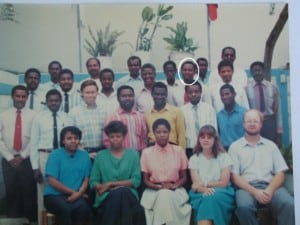
Haiti is economically considered one of the poorest countries of this hemisphere. However, this country is also unique in its natural and culturally diverse resources.
The Haitian is born with the ability to make the most beautiful artwork in the world. No matter the social class he is issued, the Haitian is capable to transform the simplest raw materials into the most enjoyable items. The Haitian paintings are of the greatest imagination, along with our sculpture in wood, steel, or stone.
Although most of its natural resources are unexploited, Haiti is one of the countries with the most beautiful beaches in the Caribbean.
Besides all of its artistic ability, most of the educated Haitians speak up to four languages: Creole (native language), French (official), English, and Spanish with proficiency.
2. I would love to hear your favorite story of children in your programs whose lives were really turned around by being part of Compassion. (Amy)
There are so many success stories that I could share but there this one that is unique to me. It is about a boy named Zaccalot. (more…)
Ask the Field: El Salvador and Haiti
Okay, everyone. Limber up those fingers. It’s time for the next round of Ask the Field. It’s time for you to ask questions of two of my fabulous coworkers, Ephraim Lindor of Haiti and Roberto Medrano of El Salvador.
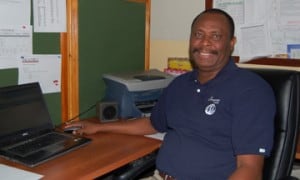 Ephraim has been working with Compassion Haiti for 22 years. (Talk about perseverance!)
Ephraim has been working with Compassion Haiti for 22 years. (Talk about perseverance!)
He first worked for Compassion as a translator, and he is now the field communications supervisor for Haiti. His daily work includes interviewing Compassion beneficiaries and writing stories about their success.
Ephraim is always smiling, and he loves watermelon. Besides all the work he does for Compassion, he’s a pastor at his local church, a loving father of a 21-year-old woman and a 15-year-old boy, and a loving husband of 23 years.
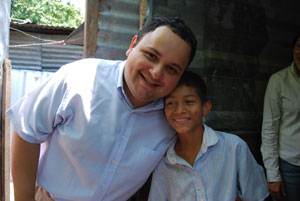 Roberto has been working with Compassion El Salvador for 6 years. He first worked for Compassion as field communications specialist and now he is the communications and tours specialist for Central America and the Caribbean, which means he is in charge of training and supporting all Compassion countries in that region for communications and tours. (He’s a busy guy!)
Roberto has been working with Compassion El Salvador for 6 years. He first worked for Compassion as field communications specialist and now he is the communications and tours specialist for Central America and the Caribbean, which means he is in charge of training and supporting all Compassion countries in that region for communications and tours. (He’s a busy guy!)
Roberto is the youth pastor of his church, and although he is just 30 years old, he has been preaching for more than 26 years. He was a child preacher, and that is one of the reasons why he loves Compassion’s ministry — he has witnessed first hand the impact of God’s Word when you are a child. He is crazily in love with his beautiful wife, Yolanda, an ORU graduate that fully supports him in working on behalf of children.
So now it’s your turn to ask away! You know the drill by now — I’ll choose 10 of your questions for them to answer.
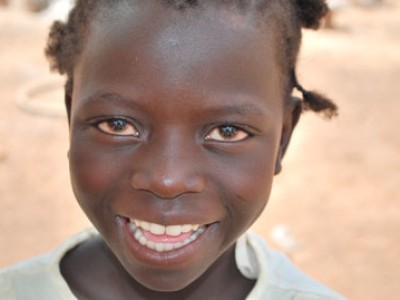
My Sisters Are Sponsored. What About Me?
In the courtyard, Mariam’s sisters, Assanata and Zourata, are preparing to leave. They both have weekly appointments that they would not miss for anything in the world. They are registered at the Assemblies of God Central Church of Koudougou Child Development Center.
Mariam always awaits their return so she can taste the food that her sisters bring home, and she does not fail to learn the songs that they sing as they return.


